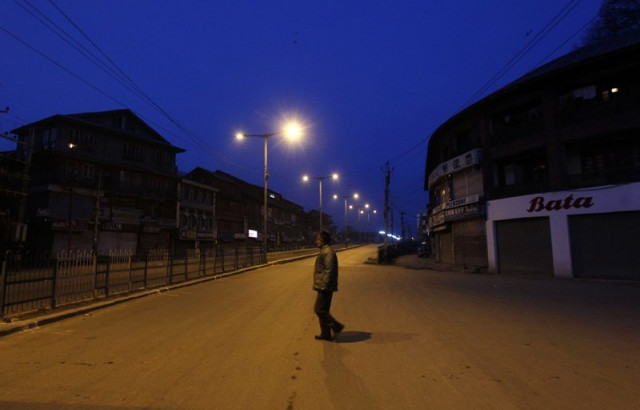Boy's fatal shooting fuels anger in Indian Kashmir
Another protester drowns in Jhelum river in his plight to escape from chasing forces.

An Indian policeman patrols a deserted road during a curfew in Srinagar February 11, 2013. PHOTO: REUTERS
Ubaid Mushtaq, who doctors say was 12 or 13 years old, died in hospital in the early hours after being shot at a protest over the hanging of a Kashmiri separatist convicted of helping to plot a deadly attack on the Indian parliament in 2001.
Meanwhile the family of Mohammed Afzal Guru, the Kashmiri Muslim who was executed on Saturday at a jail in New Delhi, only received a letter notifying them of his hanging on Monday morning.
The handling of Guru's execution has already been heavily criticised by Kashmir's Chief Minister Omar Abdullah who warned it could exacerbate the sense of frustration and alienation in what is India's only Muslim-majority state.
A police source said around 3,500 people had attended Ubaid's funeral in his home village of Watergam which is situated next to Guru's hometown Sopore.
A senior police officer, who was not authorised to speak to the press, said an inquiry had been launched but that initial reports suggested Ubaid died from firing by a paramilitary force which is under the control of the federal interior ministry.
Another police official spoke on condition of anonymity said a second body had been recovered from the Jhelum river, believed to have drowned on Sunday after protesters were chased by a contingent of the paramilitary force.
A body of a protester was recovered from the same river on Sunday after he jumped in the water in a bid to escape government forces in the Sambal area.
While the ruling Congress party has said the execution of Guru shows it is "tough on terrorism", local officials have distanced themselves from the decision.
Omar told the CNN-IBN channel that Afzal's hanging "didn't come as a complete surprise to us", coming less than three months after India carried its first execution in nearly a decade.
But he added, "We would have preferred if he wasn't hanged."
Security forces have imposed a curfew in much of Indian Kashmir since Saturday while witnesses said police numbers had been further increased to head off possible protests on the 29th anniversary of the execution of a separatist leader.
The February 11 anniversary of the death of Maqbool Bhat, a founder of the Jammu Kashmir Liberation Front (JKLF), is usually marked by large rallies and separatist groups had already called for a general strike on Monday before the curfew order.
Despite the clampdown, residents said around 20 JKLF activists came out on to the streets near Srinagar city centre before being chased away by riot police.
They were carrying posters of Maqbool Bhat and shouted slogans for Azadi (Freedom from Indian Rule) and demanded the return of Bhat's remains. He was hanged and buried at Tihar Jail - the same prison where Guru was executed.
Roads were largely deserted while shops, banks, schools and government offices were all closed.
The few people authorised to leave curfew-bound areas, were tourists who headed to the airport after being confined to their hotels over the weekend.
Guru's execution has also sparked protests in the section of Kashmir on the Pakistani side of the Line of Control, a de facto border.
At a third day of demonstrations in Pakistan-held Kashmir on Monday, activists burnt an effigy of Indian Prime Minister Manmohan Singh and handed over a written protest to the local UN office condemning the "illegal" execution of innocent Kashmiris in Indian courts.
Around 1,500 activists, including members of the main ruling Pakistan Peoples Party took part in the demonstration, police said.
Hundreds of protesters had similarly gathered on Saturday. On Sunday around 400 people held special "funeral" prayers for Guru in Muzaffarabad, the main city in Azad Kashmir.
A spokesman for Pakistan's foreign ministry voiced concern at the response of the Indian government to protests over Guru's execution.
"We... express our serious concern on the high handed measures taken by India in the wake of Afzal Guru's execution to suppress the aspirations of Kashmiris by arrests and detention of Hurriyat (freedom) leaders, curfew, news blackout and other coercive means," he said in a statement.



















COMMENTS
Comments are moderated and generally will be posted if they are on-topic and not abusive.
For more information, please see our Comments FAQ